| Reviews & Columns |
|
Reviews DVD TV on DVD Blu-ray 4K UHD International DVDs In Theaters Reviews by Studio Video Games Features Collector Series DVDs Easter Egg Database Interviews DVD Talk Radio Feature Articles Columns Anime Talk DVD Savant Horror DVDs The M.O.D. Squad Art House HD Talk Silent DVD
|
DVD Talk Forum |
|
|
| Resources |
|
DVD Price Search Customer Service #'s RCE Info Links |
|
Columns
|
|
|
Delirious Fictions of William Klein - Eclipse Series 9, The
THE MOVIES:
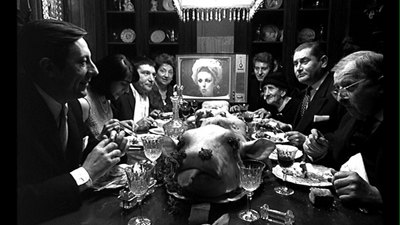
I have to admit, the name William Klein is new to me. I can admit this without shame. Having worked in a variety of entertainment-related retail establishments, the first lesson to be learned in all of them was that there is a lot more out there than one person could possibly be aware of, and every single one of those things you have never heard of, no matter how obscure, strange, or even bad, is someone's favorite thing ever. To prove this, I recently ran into one of my former co-workers from a video store job I had a couple of years ago, and we were talking about recent films we had seen. "You know what has me excited?" he said. "That Criterion boxed set of William Klein movies they have coming out. Who Are You, Polly Maggoo? is one of my favorites."
So, there you go. William Klein fits the criteria. He is obscure and strange, but he's also someone's favorite. If there is one thing he is not, however, it's bad. Far from it.
An American ex-pat who set up shop in Paris in the 1940s, Klein began his artistic career as a painter and then as a photographer. From what I've read (and there is an interesting biography with examples of his photographs here), he gravitated to bold and iconic early 20th Century art styles, emulating aesthetic schools that sought to change how artists approached making art and how audiences viewed it. When Klein turned to photography, he used a variety of tools, including wide-angle lenses and different techniques for developing the picture. He sought to find a way to bring abstraction to photo documents, to capture life not necessarily as it was, but aided with the artistic eye. He took photos for the purposes of art, showing his work in galleries and publishing monographs, and as commerce, photographing fashion for magazines.
In the 1960s, he changed his mode of expression yet again, embracing motion pictures and starting the stage of his career that he would sustain the longest. As with photography, he split his interests between capturing real life and reshaping it to his own designs, making both documentaries (notably Muhammed Ali: The Greatest) and the gonzo fiction films included in this set, Eclipse's three-disc The Delirious Fictions of William Klein.
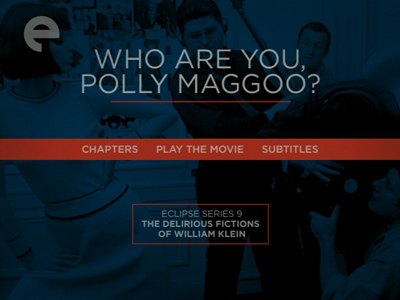
Delirious Fictions is right! Whoever came up with that title deserves some kind of award. I can't imagine a better way to describe Klein's cinema. His 1966 film Who Are You, Polly Maggoo? (101 minutes; black-and-white) is a whirling dervish of styles and ideas. Every shot is an event, every turn of the narrative a new adventure. Also, interestingly enough, when Klein wasn't using film to chronicle reality, he was critiquing it, and he had a surprisingly intuitive ability to pick-up trends that would continue far into the future, making his visions as insightful today as they were when he concocted them.
Polly Maggoo (Dorothy MacGowan) is a bucktoothed, freckle-faced American girl working as a model in Paris. She is all the rage, the fantasy girl of the faraway Prince Igor (Sami Frey) and the obsession of television reporter Gregoire (Jean Rochefort), who is filming the gamine for his journalistic personality show Who Are You?. In between this fantasy figure and this supposedly grounded intellectual is a whole culture obsessed with Polly, fashion, and the new. The film begins with a fashion show where an avant-garde designer (Jacques Seiler) displays his new line of dresses made from bent sheets of aluminum, and the influential magazine editor Miss Maxwell (Grayson Hall, zinging Diana Vreeland) declares that he is magnificent and that he has reinvented the concept of woman. Apparently, the entire female gender was out of date.
Who Are You, Polly Maggoo? casts a wide satirical net, but since its biggest target is a staple of popular culture, it's rather prescient of Klein to see how far his net needs to go. Though the eye of his storm is the over-inflated importance of the fashion world, his Polly is really a mirror to the society that worships her. When we gaze at her gazing at us from a magazine cover, we're really looking at ourselves. Gregoire claims to want to get to know the real Polly, but he really wants to see her conform to his preconceived theory than truly uncover the girl behind the beautiful face. So, too, is Prince Igor imagining her for the role she plays in his own Cinderella story. His wild daydreams show her in a pretty standard fairy tale, but the longer these fantasies go on, the more an independent Polly asserts herself and the less he likes it.
Cinderella as a metaphor comes up time and again in Who Are You, Polly Maggoo? How it pertains to Polly changes with each telling, each person having their own idea of what the glass slipper would be, allowing Klein to emphasize the cruel fetish of male possession. This also ties into fashion, which abstracts the female form and jails it in absurd concoctions. More than once, Polly is accused as a con artist that is part of some great duping of the feminine mind. Playing Polly, MacGowan stays fabulously above the fray. Though she may be a cypher in many eyes, Klein lets her be a real girl, herself, never hemmed in by the camera lens.
Of course, Klein never lets anything be hemmed in by the lens. His camera is always moving, if not literally, then by never lingering too long on one shot, cutting from one elaborate staged composition to another. There is no technique he isn't willing to employ, including using stills and freeze frame images, jump cuts that drop frames out of a sequence, musical numbers, and even animation. His sets are like art installations, populated with fads and objects of '60s modernism; overpopulated, you might say, to the point that they look futuristic. (One would suspect Roman Coppola watched Polly Maggoo when putting together CQ.) Who Are You, Polly Maggoo? is a film that is never at rest, alive with Klein's anarchic sense of humor, reminiscent of the cinematic practical jokes Richard Lester played with the Beatles. It's glorious to watch it all happen.
Arguably, Klein's inability to sit still predicts the attention deficit disorder we find in current pop culture. As much as Who Are You, Polly Maggoo? parodies the 1960s, it also seems like Klein had a crystal ball where he saw MTV, the paparazzi, and other aspects of our celebrity-obsessed media. He even beats Andy Warhol to the "fifteen minutes of fame" punch by a couple of years, shining a light on the fickleness of public taste. By the end of the movie, Polly Maggoo is out of style, and people are moving on to find new faces to love.
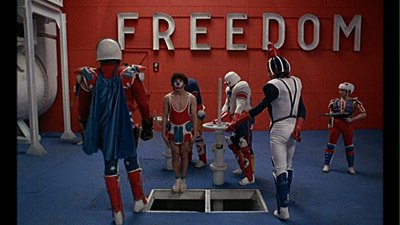
And so, too, do we move on. Klein's next full-length film was 1969's Mr. Freedom (92 minutes; color), an unrestrained evisceration of America's aggressive foreign policies and its unwavering sense of Manifest Destiny. A low-rent superhero movie, complete with kitschy costumes and strange inventions (a teleportation tube straight out of Jack Kirby!), it's a blistering comedy and the bluntest of satires, a comic book movie in a total pop-art fashion.
Mr. Freedom (John Abbey) is the top agent at Freedom Inc. A sheriff by day, he ditches the cowboy garb when he goes into battle, donning a red-white-and-blue superhero suit put together with padded muscles and football gear. After dealing with looters from a race riot on America's streets, Mr. Freedom is summonsed to headquarters by Dr. Freedom (Donald Pleasance), a guiding light on a TV screen. The first several floors of the Freedom building are taken up by oil companies and General Motors, followed by an agricultural company and personal-care product manufacturer Unilever. Top floor is Freedom Inc., the biggest of the businesses, built on top of the others. Hey, is this 1969 or right now?
Mr. Freedom is sent to France, where the Communists are flooding the borders by way of Switzerland. The evil Moujik Man (Philippe Noiret) and his twisted cohort Red China Man (played, I kid you not, by a giant dragon balloon) have already taken out Mr. Freedom's French counterpart, Captain Formidable (Yves Montand), and if the Reds aren't stopped, France will fall, opening a hole for the rest of Europe to tumble after. The anti-French rhetoric spouted by the Freedoms is, again, eerily familiar. Forty years later, and the right-wing pundits are still saying the same thing, questioning France's fortitude and taking all the credit for carrying Europe in both World Wars. It's scary that progress has been so poor in all this time that a farcical film this old can still be so right on the money.
Once in France, Mr. Freedom proceeds to bully his way toward his goal. Gathering his forces, a variety of Freedom-loving heroes played by such luminaries as Delphine Seyrig, Jean-Claude Drouot, and Serge Gainsbourg (who also contributes music), Mr. Freedom intends to make the world safe for the American way, but his twisted self-belief makes him blind to the needs of the situation. Though he claims he is willing to negotiate with his enemies, his main negotiation technique is "Do what I want, or else." Super French Man (another balloon) insists he can defend his own country, but instead of capitulating, Mr. Freedom saps the will of the French hero's soldiers, using hypno glasses to win their hearts and minds. He goes too far, though, when he guns down Red Maria (Catherine Rouvel), and the people turn against him. They take to the streets protesting the American presence in Paris, but despite overwhelming popular opinion against him, Mr. Freedom refuses to change course. He will fight it out to the bitter end.
Again, is any of this sounding familiar? Though William Klein--who is credited as writer, director, and designer--was criticizing the U.S. policies of his time, particularly as it pertained to Vietnam (one delicious sight gag is of a poster declaring that JFK is wanted for treason) and resistance to the civil rights movement, his portrayal of the overbearing cowboy with an exaggerated sense of entitlement using divisive ideology and empty platitudes to justify aggressive greed dials right in to much of our nation's current state of unrest. In his final speech, Dr. Freedom declares that the problem is not with spreading democracy to the world, but that they have chosen to bestow it on people who aren't ready to accept the blessed gift by choice. Thus, force it on them now, because they will thank us later. (Surprisingly, religion plays very little role in this. It seems to be a little too complicated for the single-minded Mr. Freedom, who is nonplussed by his meeting with Jesus-stand-in Christ Man (Sami Frey) and doesn't recognize the symbolism in the stigmata he later suffers.)
Mr. Freedom's satirical technique is pounded out with the meatiest of fists, that's to be sure, but it's also raucous fun. The movie is colorful and outrageous, and Klein has a gas with comic book conventions. The free-for-all brawls can sometimes be a little too out of control for my money, but the basic mission of Mr. Freedom and the garish costumes of his allies and enemies are fantastic in their excess. Apparently this film was dismissed upon its initial release (and delayed almost a year due to the May 1968 political turmoil in France; the movie even contains documentary footage of earlier political demonstrations). Its lack of critical and box office success could possibly have been because Klein's jabs hit a little too close for comfort. The time is ripe to rediscover this one, though. Given the current political climate and the popularity of superhero movies, Klein's candy-coated dissent should finally go down as the director always intended.
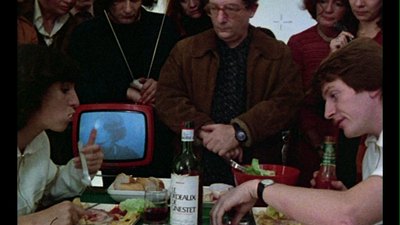
It was eight more years before William Klein made the third of his "delirious fictions." The Model Couple (1977; 101 minutes; color) is my least favorite of the trio (and, really, the first film is easily the best), but it only speaks to how good The Model Couple's predecessors are that this creatively rich movie cold ever possibly come in third. The Model Couple imagines a contemporary France that has a Ministry of the Future. Determined to design a city to meet the needs of people facing the end of the century, they choose an ideal husband and wife to isolate in a specially designed apartment so they can be monitored and tested. Once classified, the Ministry can then plan for a tomorrow perfectly suited to the French citizens.
Jean-Michel (Andre Dussolier) and Claudine (Anemone) were chosen for their high percentage of average traits (77%, they are told). Once in their apartment, they are hooked to wires, set about to tasks, and submitted to a variety of experiments to map the outer boundaries of their relationship and the conditions they will submit to. They are poked and prodded by two psychosociologists (Jacques Boudet and Zouc), and the entire procedure is recorded and shared with the television viewing audience. It's a little like the "Big Brother" TV show but with at least a semblance of social value, and the host of the program (Andre Penvern) and his panel of commentators is easily as annoying as the constant chatter streaming out of the flapping maws of pundits on cable news.
Initially, while the program maintains the illusion of wanting to uncover the couple's true wants, eventually when results stop conforming to what is convenient to the Ministry, the psychosociologists start to try to manipulate Jean-Michel and Claudine into conforming to the anticipated results. (Making them just like Polly Maggoo and the whole of the world under Freedom Inc.) As Klein sees it, the future is not always helpful, and all the technology and the gadgets it brings could just as likely enslave the users as free them. The experiment also begins to take its toll on both the administrators and the subjects, causing them to go a little stir crazy. Even worse, the public interest starts to wane, and a new strategy will have to be formulated or the house might be shut down. In a media culture that is constantly feeding on itself, there is always a need for a new meal.
The Model Couple is Klein's least detailed production. The sets and the many props are painted in solid colors, with the walls being totally white. Klein focuses most of the art direction on the gadgets, including the elaborate monitoring systems that get attached to Jean-Michel and Claudine. Though he doesn't rely on the rapid cutting or even the complicated compositions of Polly Maggoo, he does maintain a sense of playfulness. There are multiple sequences where the footage is shown in double-time while being underscored with narrative songs composed by Michel Colombier and performed by Hugues Aufray, a '60s performer known for his French adaptations of Bob Dylan tracks. There are also Godardian experiments in sound, including a scene where the couple notices the sound of their words is out of sync with the movement of their lips. In fact, there is a lot of Godard in the political sloganeering and the debates the psychological experiments inspire.
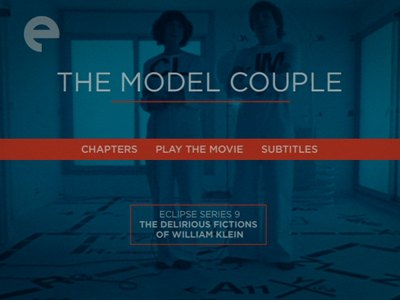
One linking element between all of these films is television sets. In each, we see the characters appearing on television shows and both being watched and communicating through closed-circuit monitors. In Polly Maggoo, a fantasy sequence is shot from Polly's point of view as she sits down at a table for a feast, and she sees herself on a television on the other side of the banquet. In Mr. Freedom, Dr. Freedom only appears as a head on a screen, and Mr. Freedom wears a mini-television communicator on his wrist. By The Model Couple, the entire lives of the characters have been reduced to signals bounced from one TV to another. Though Klein's targets are different in each picture, each subject is somehow affected by the growing presence of celebrity culture, television, and media scrutiny.
William Klein made his last film in 1999, a documentary about Handel's Messiah. Apparently he is still alive and well, however, having rejuvenated his interest in photography. Coincidentally, I am writing this on April 19th, 2008, William Klein's 80th birthday. I can imagine no better present for such an anniversary than for his films to receive this DVD revival. The Delirious Fictions of William Klein - Eclipse Series 9 is an orgasmic revelation. Klein was a visionary filmmaker, well ahead of his time. I'd love to know what he makes of the current world and how his movies fit within it. Would he garner any satisfaction from his predictions becoming true, or would he despair that were he to have the opportunity to satirize our culture all over again, the same old jokes would still apply?
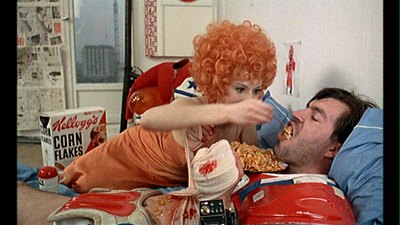
THE DVD
Video:
All three movies in The Delirious Fictions of William Klein have been transferred to disc at 1.66:1 aspect ratio. The prints are of a consistent good quality, with all of them being mostly free of dirt and scratches or any problems with digital pixilation. Each has a couple of instances where you will see a line running down the screen, but these disappear as quickly as they come. Given the low-budget and obscure nature of the movies, it's a wonderful boon that such excellent source material still existed to make these DVDs.
Who Are You, Polly Maggoo? is the only black-and-white film, and to my eye its image was the crispest of the three. There were a couple of points where I noticed some flickering in the background tones, but these were by no means extended problems. The other two movies, Mr. Freedom and The Model Couple, are both full-color features, and I think they mostly look really good. The colors can be a little tinny, but I think that is just the nature of when they were shot and not necessarily a fault in the DVD mastering.
Sound:
Each movie has a monaural mix of its original soundtrack. Mr. Freedom is in English, the other two are in French. All three DVDs have English subtitles, including Mr. Freedom, even though there is no place to activate them on the main menu. They can be turned on using your remote, however, and given the "SDH" logo on the back cover, are geared toward the deaf and hearing impaired.
I noticed no faults in the audio soundtracks. There was no hiss, no metallic tones, everything sounds clear as a bell.
Extras:
As noted in the main review, the Eclipse series is intended as a no-frills alternative, so there are no bonus features on any of the DVDs. The five movies come housed in individual slimline cases that fit inside a cardboard slipcover. They can be slid out of the top or the bottom of the cover rather than the side. By way of supplemental material, each case has a short, informative essay about the film's history, along with some background on William Klein.
FINAL THOUGHTS:
Wow. To try to summarize the infinite and unpredictable pleasures of The Delirious Fictions of William Klein - Eclipse Series 9 in a short paragraph seems like a fool's errand. How to encapsulate an imagination so unbridled? Having been a painter and a photographer before turning to cinema, William Klein had a marvelous eye for interesting visuals and evocative compositions, and when he broke out of the static frames of those other art forms, he threw all caution to the wind. The narratives in the three films contained in this box, made between 1966 and 1977, are savagely satirical, picking apart celebrity culture, American arrogance and imperialism, and the false promises of technology. Klein quickly mastered cinema, and he did so with a style and a panache all his own. Highly Recommended.
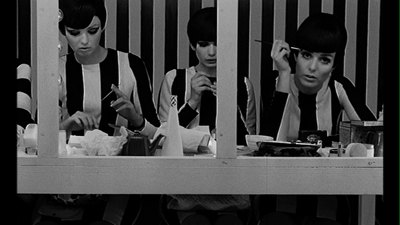
Jamie S. Rich is a novelist and comic book writer. He is best known for his collaborations with Joelle Jones, including the hardboiled crime comic book You Have Killed Me, the challenging romance 12 Reasons Why I Love Her, and the 2007 prose novel Have You Seen the Horizon Lately?, for which Jones did the cover. All three were published by Oni Press. His most recent projects include the futuristic romance A Boy and a Girl with Natalie Nourigat; Archer Coe and the Thousand Natural Shocks, a loopy crime tale drawn by Dan Christensen; and the horror miniseries Madame Frankenstein, a collaboration with Megan Levens. Follow Rich's blog at Confessions123.com.
|
| Popular Reviews |
| Sponsored Links |
|
|
| Sponsored Links |
|
|
| Release List | Reviews | Shop | Newsletter | Forum | DVD Giveaways | Blu-Ray | Advertise |
|
Copyright 2024 DVDTalk.com All Rights Reserved. Legal Info, Privacy Policy, Terms of Use,
Manage Preferences,
Your Privacy Choices | |||||||













